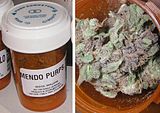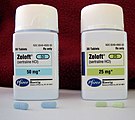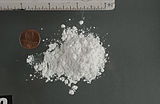Psychotropic substance

A psychotropic substance is an active ingredient that affects the human psyche . It can also be a mixture of several active ingredients. Other neutral names for it are also psychoactive substance or psychotropic (plural psychotropics ; from the Greek psychḗ “ soul ” and tropḗ “(to) turn”). These are intended to replace the emotionally negative terms drug or intoxicant and, in contrast to the term drugs , do not refer to legality or illegality. The terms psychoactive substance and narcotic drug are not necessarily synonymous and should therefore not be used interchangeably, as u. a. and psychotropic drugs are among the psychotropics.
Any externally supplied substance that causes changes in a person's psyche and consciousness is called psychotropic or psychoactive . Such an influence can be subliminal and, for example, be experienced positively as stimulation, relaxation or a pleasant change in mood. But it can also have a profound effect on the state of consciousness and lead to seizures , impaired consciousness or, in the worst case, to a coma .
The possible consequential health disorders are summarized in the international classification system ICD-10 as psychological and behavioral disorders caused by psychotropic substances - e.g. acute intoxication , multiple substance use , substance-induced psychosis or dependence syndrome caused by psychotropic substances (see also model psychosis ).
Psychotropic substances have been used to treat mental disorders since ancient times. However, it was only in the 1950s that the real era of psychopharmacology began . It was characterized by precisely defined substances and dosages.
Classification
Overview of special classes of psychoactive substances and their effects
-
Psychotropic drugs : used to treat mental and neurological diseases; with the subclasses:
- Antidepressants : effective against depressive moods
- Neuroleptics : depressant and anti- psychotic effects
- Tranquillants , anxiolytics : anxiolytic and relaxing
- Phase prophylactic agents : mood-stabilizing
- Psychostimulants : increase mental and physical endurance as well as the ability to concentrate
- Antidementia drugs , nootropics : drugs used to treat dementia
- Hypnotics : promote the sleep process
-
Hallucinogens : cause a greatly altered perception of reality; with the subclasses:
- Psychedelics : create psychedelic states
- Dissociative : active substances that cause dissociative effects
- Delirium : agents that cause a condition similar to delirium
- Entheogens : active substances used for ritual, spiritual or religious purposes
-
Stimulants : substances that have a stimulating effect on the organism; with the subclasses:
- Empathogens : active ingredients that create the feeling of forming a unit with other people
- Entactogens : active ingredients that increase the awareness of one's own emotions
- Analgesics : active ingredients that have a pain reliever ( analgesic ) effect
- Aphrodisiacs : active ingredients to stimulate or increase the libido
Methylphenidate preparations from various manufacturers
Medicinal hemp ( cannabis flos )
Sertraline , a selective serotonin reuptake inhibitor (SSRI)
Psilocybe cubensis contains psilocybin and psilocin
Dimethyltryptamine (DMT), a naturally occurring, hallucinogenic tryptamine - alkaloid
Cocoa pods contain theobromine
Cocaine hydrochloride from the coca bush
See also
- List of plants with psychotropic agents
- Convention on Psychotropic Substances (United Nations)
- United Nations Convention against Illicit Traffic in Narcotic Drugs and Psychotropic Substances
- Psycholytic psychotherapy (use of psychotropic substances to support therapy)
- Drug checking (drug testing of illicit psychotropic substances through chemical analysis)
- Psychonautics (exploring one's own psyche and the unconscious, including with psychoactive substances)
- New psychoactive substances : designer drugs
literature
- Maximilian von Heyden: Handbook of Psychoactive Substances. Springer, Berlin / Heidelberg 2017, ISBN 978-3-642-55124-6 ( reading sample in the Google book search).
- Klaus Aktories u. a .: Psychotropic drugs - pharmacotherapy of mental illnesses. In: Derselbe, Ulrich Förstermann , Franz Hofmann , Klaus Starke (eds.): General and special pharmacology and toxicology. 12th edition. Urban & Fischer, Munich 2017, ISBN 978-3-437-17212-0 , pp. 269–305 ( reading excerpt in the Google book search).
- Gerhard founder, Otto Benkert: Manual of psychopharmacotherapy. 2nd Edition. Springer, Berlin 2011 ( excerpt in the Google book search).
- Bert Marco Schuldes: Psychoactive Plants - More than 80 plants with stimulating, euphoric, calming, sexually arousing or hallucinogenic effects. 17th edition. Pieper & Grüne Kraft, Löhrbach 2011, ISBN 978-3-925817-64-9 .
- Florian Holsboer (Hrsg.): Manual of psychopharmacotherapy. Springer, Heidelberg 2008, ISBN 978-3-540-20475-6 .
- Christian Rätsch : Encyclopedia of Psychoactive Plants. 7th edition. AT, Aarau 2004, ISBN 3-85502-570-3 .
- Alexander Shulgin , Ann Shulgin: TIHKAL, the Continuation. Transform, Berkeley 1997, ISBN 0-9630096-9-9 (English; full version on erowid.org ).
- Alexander Shulgin, Ann Shulgin: PIHKAL: A Chemical Love Story . Transform, Berkeley 1991, ISBN 0-9630096-0-5 (English; full version on erowid.org ; PIHKAL = Phenethylamines I Have Known And Loved = "Phenylethylamines that I knew and loved").
Web links
Individual evidence
- ↑ Entry on caffeine. In: Römpp Online . Georg Thieme Verlag, accessed on October 1, 2018.
- ↑ a b Eckhard Beubler: Pharmacology of psychotropic substances. In: Derselbe, Hans Haltmeier, Alfred Springer (ed.): Opiate addiction. Interdisciplinary aspects for practice. 2nd Edition. Springer, Vienna / New York 2006, ISBN 3-211-29116-4 , pp. 51–64 ( page views in the Google book search).
- ↑ Hans Bangen: History of the drug therapy of schizophrenia. Berlin 1992, ISBN 3-927408-82-4 .








